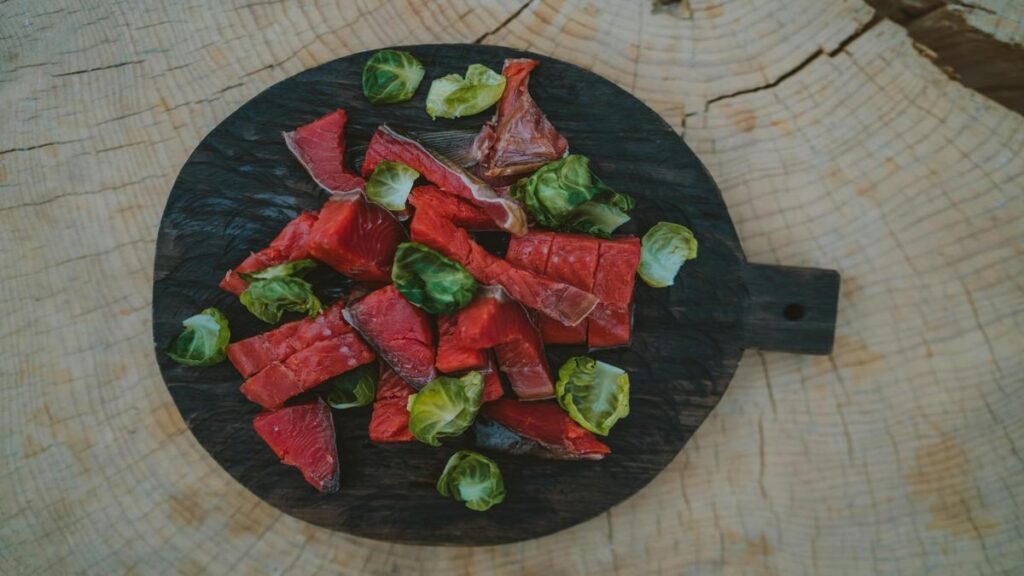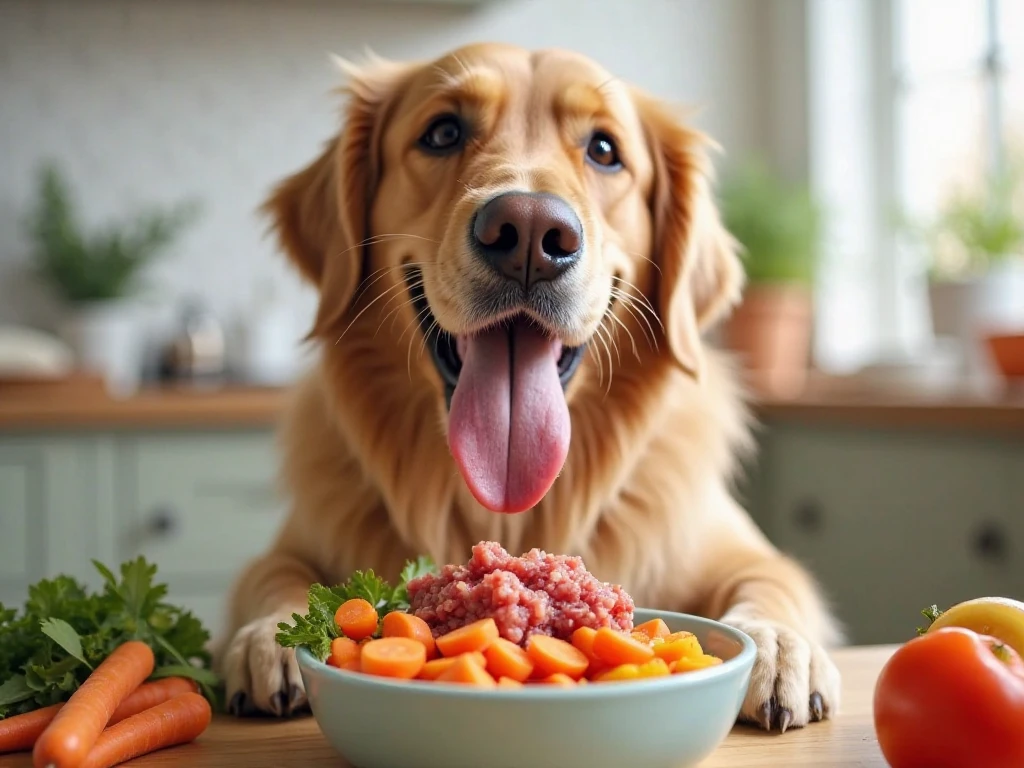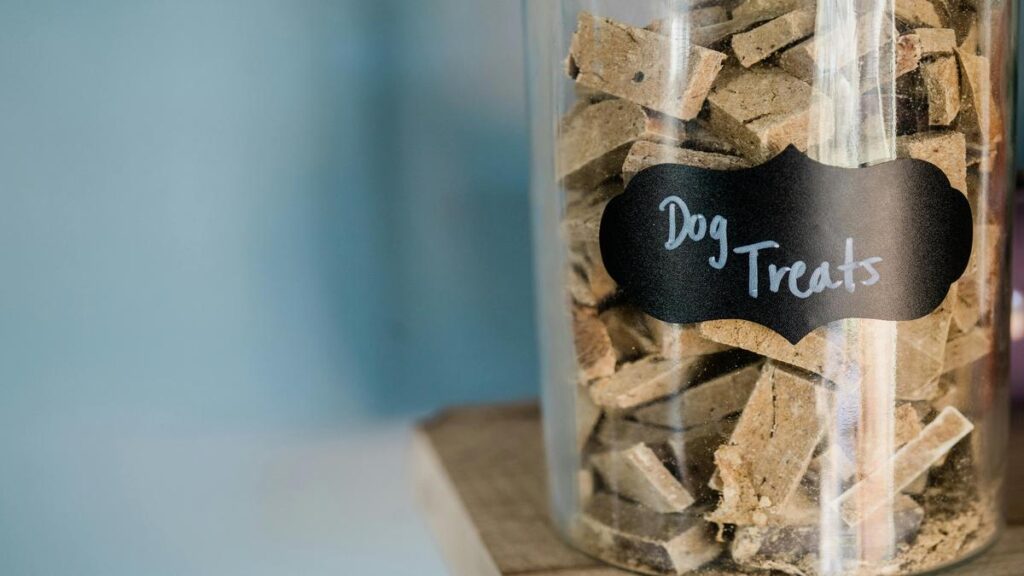Natural Diets for Dogs Powerful Tips for Senior Dogs is your gateway to keeping your aging pup happy and healthy.
As dogs get older, their nutritional needs change.
You want to make sure you choose the right food and supplements for your furry friend. In this article, you’ll discover how to tailor their diet, explore easy homemade recipes, and learn about the best natural options.
Let’s dive in and help your senior dog thrive!
Important Points to Remember
- Choose whole foods for your senior dog.
- Add more fruits and veggies to their meals.
- Stay away from processed foods and fillers.
- Keep their water bowl full and fresh.
- Talk to your vet about your dog’s diet.

Summary
Understanding Natural Diets for Dogs: What They Really Are
Alright, let’s dive right into what a natural diet for dogs actually means. When we talk about natural diets, we’re referring to food that’s as close to what dogs would eat in the wild. Think about it: wolves don’t munch on kibble, right? They hunt for meat, forage for fruits, and nibble on some veggies. So, a natural diet for your furry friend usually includes high-quality proteins, whole grains, and fresh produce. For more on this topic, check out the essential guide to natural dog diets.
Now, you might be wondering, What’s wrong with the dog food I buy at the store? Well, not all commercial dog food is created equal. Many brands pack their products with fillers, preservatives, and artificial flavors. These can be hard on your dog’s digestive system and overall health. A natural diet, on the other hand, focuses on wholesome ingredients that provide real nutrition. To understand the benefits of this approach, consider exploring the secrets and benefits of natural diets.
You can think of it like cooking at home versus eating fast food. Sure, fast food is convenient, but nothing beats a home-cooked meal with fresh ingredients. The same goes for your dog’s food. By choosing a natural diet, you’re likely to see improvements in their energy levels, coat condition, and even their mood. For tips on transitioning to a natural diet, visit proven methods for diet transition.
Why Choose Natural Diets for Senior Dogs?
As our dogs age, their nutritional needs change. Senior dogs often deal with health issues like arthritis, dental problems, or weight gain. This is where a natural diet can really shine. It’s all about providing the right nutrients to support their aging bodies. For insights on boosting your dog’s vitality, check out this resource.
First off, senior dogs need more easily digestible proteins. Their metabolism slows down, and their bodies may struggle to break down the same foods they used to enjoy. A natural diet typically includes high-quality, lean meats that are easier on the stomach. Plus, incorporating omega-3 fatty acids from fish or flaxseed can help with joint health and inflammation. For more information on dietary requirements, see expert tips for a balanced diet.
Another thing to consider is weight management. Many senior dogs tend to gain weight, which can lead to further health issues. A natural diet can help you control portions and ensure that your dog is getting the right nutrients without the extra calories from fillers. For practical advice on starting a natural diet, visit easy ways to start a natural diet.
And let’s not forget about hydration! Older dogs can be prone to dehydration, so including fresh fruits and veggies that have high water content can be a game changer. Think watermelon or cucumbers – both are refreshing and hydrating treats.
Healthy Dog Food Options: What to Look For
When you’re on the hunt for healthy dog food options, there are a few key things you should keep an eye out for. First, always check the ingredient list. The first ingredient should be a high-quality protein source, like chicken, beef, or fish. If you see vague terms like meat by-products or animal meal, it’s best to steer clear.
Next, look for whole grains or veggies as secondary ingredients. Brown rice, sweet potatoes, and peas are all great options. They provide essential vitamins and minerals, plus they’re a good source of fiber, which is important for digestion. For a comprehensive guide on preparing natural meals, check out this ultimate guide.
Also, consider the presence of fruits and vegetables. Ingredients like blueberries, carrots, and spinach can offer antioxidants and other health benefits. They help boost the immune system and keep your dog feeling spry.
Lastly, be cautious of artificial additives. You want to avoid preservatives, colors, and flavors that can be harmful over time. The fewer the ingredients, the better. If you can’t pronounce it, your dog probably shouldn’t eat it!
If you are someone who does not have time to prepare food for your pet, consult a veterinarian about this kibble Dr. Harvey’s Canine Health Miracle Dog Food. and to read about this Reviews

Benefits of Raw Diet for Dogs: Is It Right for Your Senior?
Now, let’s chat about the raw diet. This one’s a bit controversial, but many dog owners swear by it. So, what’s the deal? A raw diet typically includes uncooked meat, bones, fruits, and veggies. The idea is to mimic what dogs would eat in the wild, and many believe it leads to healthier dogs. For more insights, consider reading proven methods for a longer life.
For senior dogs, a raw diet can provide several benefits. First, it’s packed with natural enzymes that aid in digestion. This can be especially helpful for older dogs that may have sensitive stomachs. Plus, the high protein content can help maintain muscle mass, which is crucial as they age.
However, there are some things to consider before jumping in. Raw diets can be risky if not done properly. You need to ensure you’re providing a balanced diet, which means including the right amounts of meat, bones, and vegetables. It’s also important to handle raw meat safely to avoid any bacterial contamination.
If you’re thinking about switching to a raw diet for your senior pup, it might be worth consulting with your vet first. They can help you figure out the best approach and ensure your dog is getting everything they need.
Homemade Dog Food Recipes: Easy and Nutritious Ideas
Making your own dog food might sound daunting, but it’s easier than you think! Plus, it can be a fun way to ensure your dog is eating a natural diet. Here are a couple of simple recipes to get you started. For more delicious recipes, check out top 10 natural dog diet recipes.
Chicken and Rice Delight
- Start with 2 cups of cooked chicken (shredded).
- Add 1 cup of cooked brown rice.
- Toss in 1 cup of chopped carrots and 1 cup of peas.
- Mix everything together and serve!
This recipe is packed with protein and fiber, making it a great option for senior dogs.
Beef and Veggie Stew
- Brown 1 pound of ground beef in a pot.
- Add 4 cups of water and bring to a boil.
- Stir in 1 cup of chopped sweet potatoes, 1 cup of green beans, and 1 cup of carrots.
- Let it simmer until the veggies are soft, then cool before serving.
This hearty stew is not only nutritious but also comforting for your older dog.
Remember to introduce any new food gradually to avoid an upset stomach. And always check with your vet to ensure that your homemade meals are balanced and meet your dog’s specific needs.
Senior Dog Nutrition Tips: Keeping Your Pup Healthy
Keeping your senior dog healthy is all about nutrition. Here are some handy tips to help you along the way:
- Portion Control: Older dogs don’t need as many calories as they did when they were younger. Keep an eye on their weight and adjust portions accordingly.
- Frequent, Smaller Meals: Instead of two big meals, consider feeding your senior dog smaller meals throughout the day. This can help with digestion and keep their energy levels stable.
- Stay Hydrated: Always make sure your dog has access to fresh water. If they’re not drinking enough, consider adding water to their food or offering wet food.
- Monitor Their Weight: Regularly check your dog’s weight. If they’re gaining or losing too much, it might be time to adjust their diet.
- Watch for Allergies: Older dogs can develop food sensitivities. If you notice any changes in their skin, coat, or digestion, it might be worth looking into their diet.
- Consult Your Vet: Regular check-ups are key. Your vet can help you create a nutrition plan tailored to your dog’s specific needs.
Best Supplements for Senior Dogs: What You Need to Know
As dogs age, they might need a little extra help from supplements. Here’s a quick rundown of some beneficial options:
- Glucosamine and Chondroitin: These are great for joint health. They can help reduce inflammation and improve mobility, which is especially important for senior dogs.
- Omega-3 Fatty Acids: Found in fish oil, these can help with skin and coat health, as well as reduce inflammation.
- Probiotics: These can aid in digestion and promote gut health, which is crucial for older dogs.
- Antioxidants: Supplements rich in antioxidants can help support the immune system and combat the effects of aging.
Before starting any new supplements, it’s a good idea to talk to your vet. They can recommend the best options for your dog’s specific health needs and conditions.
Organic Dog Food Advantages: Is It Worth It?
You might have heard a lot about organic dog food lately. But is it really worth the hype? Well, there are some advantages to consider. For a deeper understanding of organic options, visit this informative article.
First, organic dog food is made from ingredients that are free from pesticides, synthetic fertilizers, and artificial preservatives. This means you’re giving your dog a cleaner, more natural diet. Plus, organic farming practices are generally better for the environment, which is a bonus if you’re eco-conscious.
Another perk is the quality of the ingredients. Organic dog food often contains higher-quality proteins and grains, which can lead to better overall health for your pup. You might notice improvements in their coat, energy levels, and even digestion.
However, organic dog food can be more expensive. So, it’s important to weigh the benefits against your budget. If you can swing it, it’s definitely worth considering. But if not, just focus on finding high-quality, natural options that fit your budget.
Natural Remedies for Senior Dog Health: Gentle Solutions
Sometimes, all your senior dog needs is a little extra TLC. Here are some natural remedies you can consider:
- Turmeric: This spice has anti-inflammatory properties and can help with joint pain. You can sprinkle a little on their food, but check with your vet for the right dosage.
- Coconut Oil: Great for skin and coat health, coconut oil can also aid digestion. Just a teaspoon a day can do wonders.
- Pumpkin: Plain canned pumpkin (not the spiced pie filling) is a fantastic source of fiber and can help with digestive issues.
- Chamomile Tea: This can help soothe an upset stomach or anxiety. Just brew a cup, let it cool, and offer it to your dog in their water bowl.
Always consult with your vet before trying any new remedies. They can help ensure that what you’re using is safe and effective for your dog’s specific health needs.
Senior Dog Diet Recommendations: Tailoring Food to Their Needs
When it comes to feeding your senior dog, there’s no one-size-fits-all approach. Tailoring their diet to their specific needs is essential. Here are some recommendations:
- Consider Their Activity Level: If your dog is still quite active, they might need a diet that’s higher in protein and calories. But if they’re more of a couch potato, you’ll want to cut back.
- Health Conditions Matter: If your dog has specific health issues like diabetes or kidney problems, their diet will need to reflect that. Always work with your vet to create a tailored plan.
- Texture is Important: Some senior dogs have dental issues and might struggle with hard kibble. In that case, consider softer foods or even wet dog food.
- Include Variety: Just like us, dogs can get bored with the same food every day. Mixing in different proteins or veggies can keep mealtime exciting.
- Keep an Eye on Changes: As your dog ages, their needs may change. Regular check-ups will help you stay on top of any necessary dietary adjustments.
Nutritious Dog Treats for Older Dogs: Yummy and Healthy Choices
Let’s not forget about treats! Just because your dog is getting older doesn’t mean they can’t enjoy a tasty snack. Here are some healthy options:
- Carrot Sticks: Crunchy and low in calories, carrots are great for dental health too!
- Apple Slices: Just make sure to remove the seeds. Apples are a great source of vitamins A and C.
- Peanut Butter: Most dogs love peanut butter! Just choose a brand that doesn’t contain xylitol, which is toxic to dogs.
- Sweet Potato Chews: These are packed with nutrients and can be made easily at home. Just slice, bake, and let them cool!
- Commercial Treats: If you prefer store-bought, look for treats made with natural ingredients and no artificial additives.
Treats are a great way to bond with your dog, so don’t be afraid to get creative. Just remember to keep the portions in check!
Conclusion
In wrapping up this journey into the world of natural diets for senior dogs, remember that your furry friend deserves the best care as they age.
By choosing wholesome ingredients, incorporating fresh fruits and veggies, and steering clear of processed foods, you can significantly enhance their quality of life.
It’s all about tailoring their diet to meet their unique needs, keeping them spry and happy in their golden years.
So, take the plunge! Experiment with homemade recipes, consult with your vet, and make informed choices about their nutrition. Your dog will thank you with wagging tails and joyful barks!
For more insights and tips on keeping your canine companion healthy, don’t forget to explore more articles at Tech Havela. Happy feeding!
Frequently asked questions
What are natural diets for dogs?
Natural diets for dogs are meals made from whole foods. They include meat, veggies, and grains. These diets help promote good health.
What are the benefits of natural diets for senior dogs?
Natural diets can improve energy and digestion. They also support healthy skin and coat. Plus, they can help with weight management.
Should I consult a vet before changing my dog’s diet?
Yes! Always talk to your vet first. They can give you advice tailored to your dog’s needs. This is especially important for senior dogs.
How do I transition my senior dog to a natural diet?
Make the switch slowly! Mix the new food with the old food. Gradually increase the new food over a week. This helps avoid tummy troubles.
Can I make my dog’s food at home?
Absolutely! You can prepare home-cooked meals for your dog. Just ensure they get the right nutrients. Research recipes designed for dogs.
Are there any foods I should avoid for senior dogs?
Yes! Avoid chocolate, grapes, and onions. Some human foods can be toxic. Always check which foods are safe!
How often should I feed my senior dog a natural diet?
Most senior dogs do well with two meals a day. However, this can vary. Keep an eye on your dog’s weight and adjust as needed.
**Sidnir Vieira**
Founder of TechHavela
A passionate pet and tech content creator, helping dog owners across the U.S. make smarter decisions for their furry friends.



